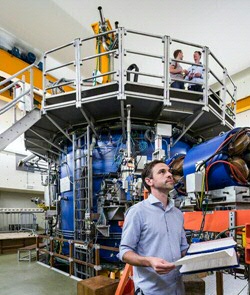New international funding for AGOR particle accelerator on its 20th birthday

The KVI-Center for Advanced Radiation Technology (KVI-CART) at the University of Groningen has again secured international funding for experiments with the AGOR particle accelerator. The AGOR facility was put into operation twenty years ago.
The new funding provides opportunities to develop medical applications and conduct research on the effect of radiation on materials, electronic components and sensors. These fields of research will be particularly important in the future.
‘With AGOR, the University of Groningen has hosted a leading facility for twenty years,’ says Vice President of the Board of the University Jan de Jeu. 'The newly awarded funding underlines AGOR’s importance once again. ‘I am confident that AGOR will continue to make an important contribution to top-level research in the coming years.’
Recognition by the ESA
The European Space Agency has recognized AGOR as a ground-based facility for research on the biological effects of radiation in space. Through KVI-CART, the University of Groningen is one of 17 academic, medical and commercial partners in the research programme called INfraStructure in Proton International Research (INSPIRE), a programme funded by the European Union.
European funding since 2005
The AGOR facility has received European funding for experiments conducted by international researchers in nuclear physics and related disciplines since 2005. Selected experiments are funded by defraying travel and accommodation expenses of researchers from outside the UG, and by helping to fund AGOR’s operational costs.
In business for 20 years
The AGOR facility has been operational for twenty years. This milestone will be celebrated at the festive event ‘AGOR: the next 20 years!’ on Friday 20 October 2017, where we will look ahead to the future. Short presentations, demonstrations and a guided tour will highlight our focus areas and the research opportunities provided by the AGOR facility , including physics research and technological research in proton therapy, radiobiological research and radiation research for industry.
More news
-
29 January 2026
Microplastic research - media hype or real danger?
-
27 January 2026
ERC Proof of Concept grant for Maria Loi
